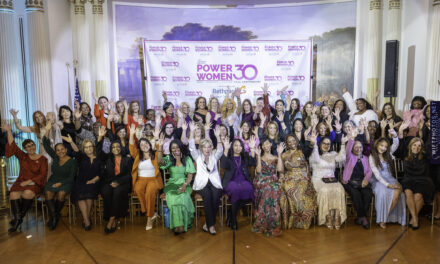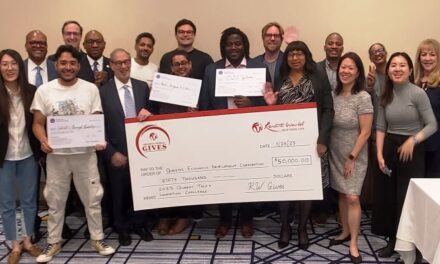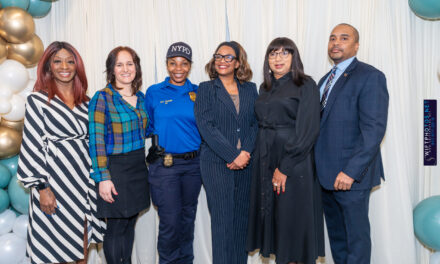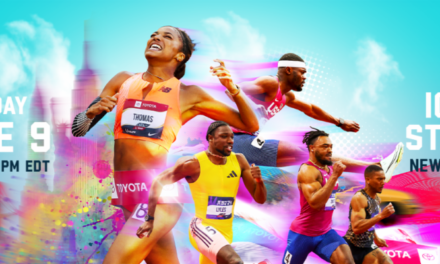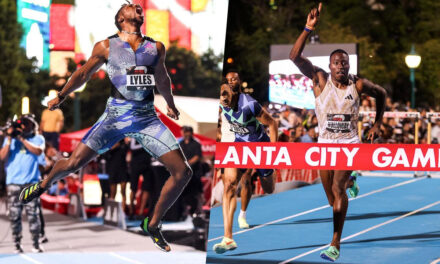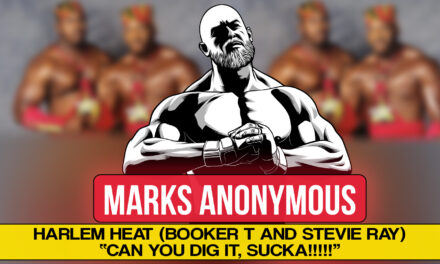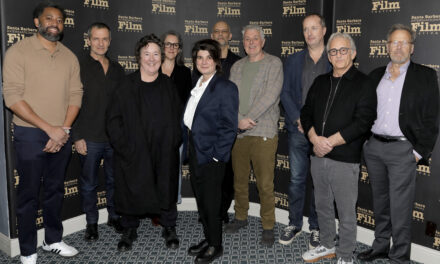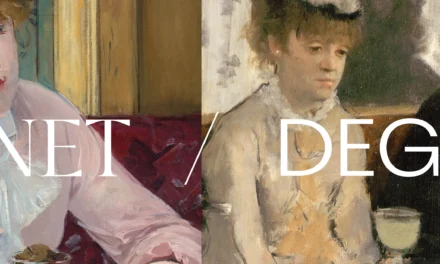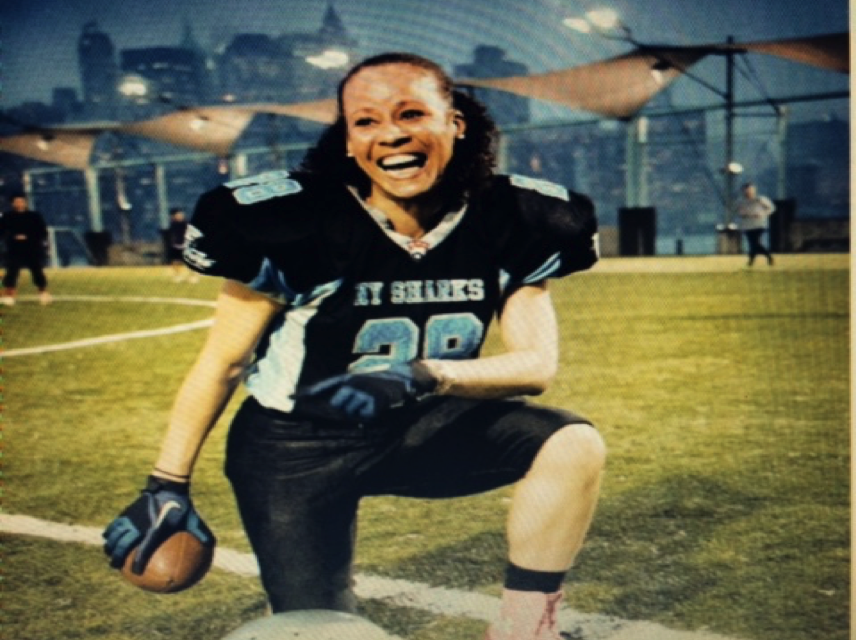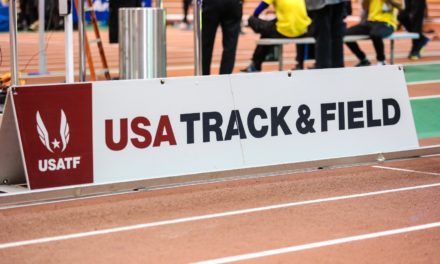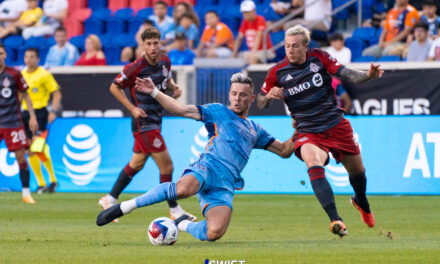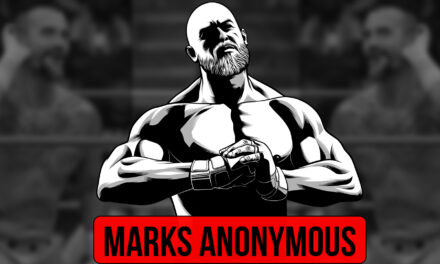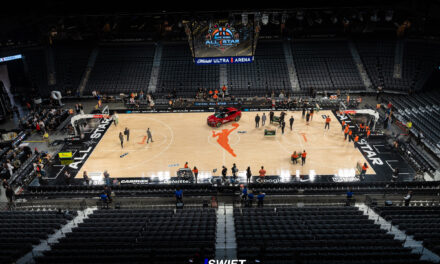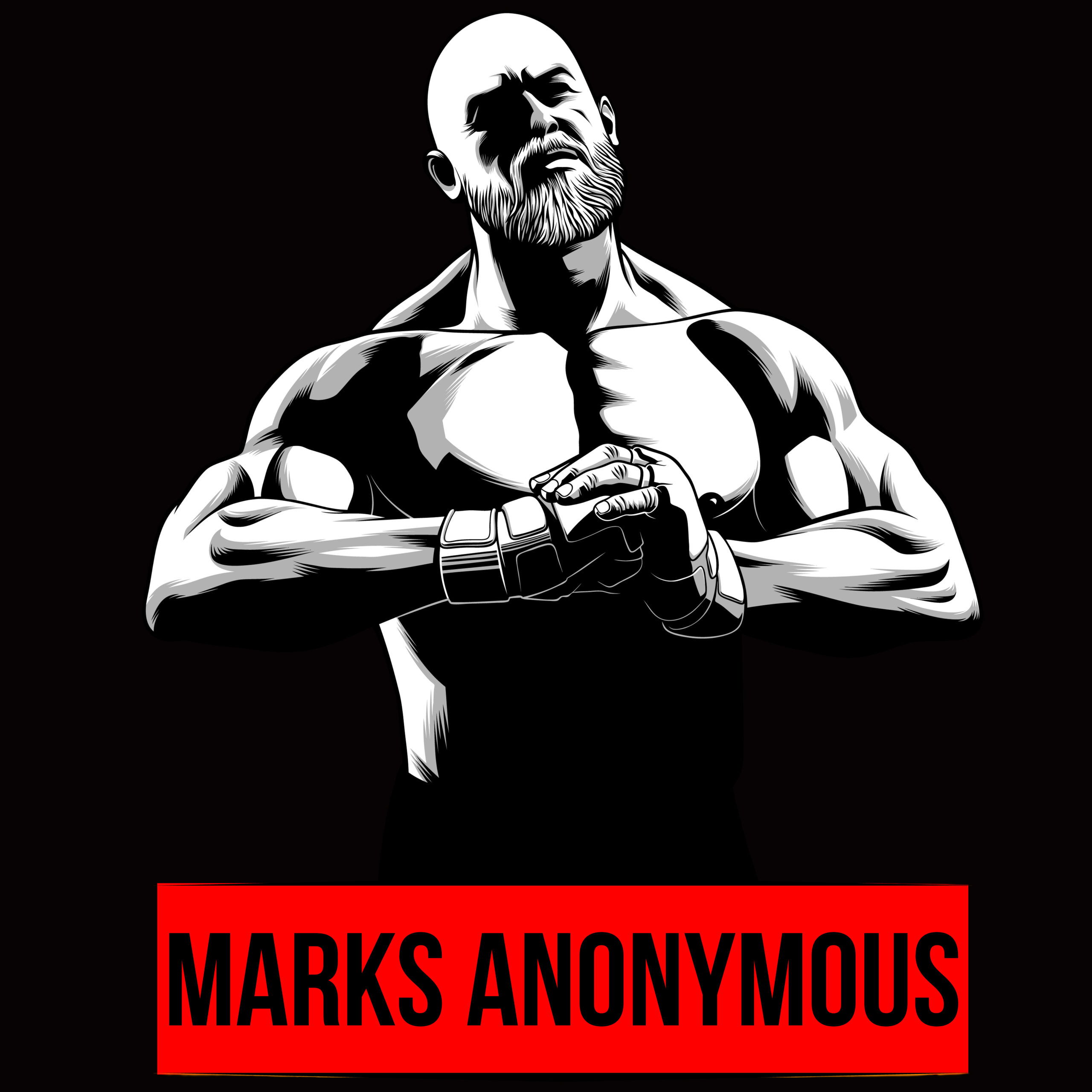Women’s professional football player – New York Sharks
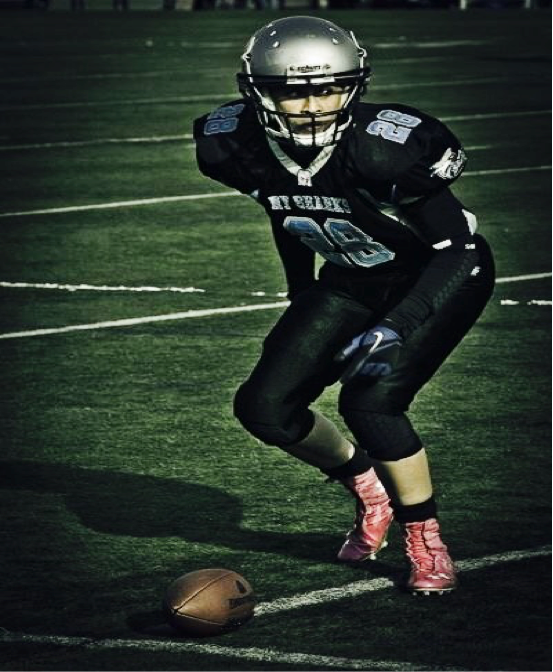
As a sports reporter and true fan of football, I’m almost ashamed to admit that, up until recently, I have totally been in the dark about the IWFL. Now I’m willing to bet there are quite a few of us out there who are right now trying to figure out what the acronym stands for.
Let’s see, maybe “Integrated Water Front Laborers”? No, that can’t be right. How about something far more sinister like “Independent Women Freedom Liberators”? Not quite, but getting closer.
I’m happy to report that it is nothing as far-fetched as the above-mentioned titles, but simply stated it stands for Independent Women’s Football League. In other words, it’s professional full-contact football for women.
Yes brothers, the ladies lace up the cleats, put on the shoulder, hip and knee pads, strap on the helmet, and just like the men on any given weekend, go out on a regulation-size football field and knock the hell out of each other.
I recently had the privilege of meeting a member of this exclusive group. Ms. Collette Smith is quite an engaging figure to say the least, but don’t let the ‘Ms.’ at the beginning of her name fool you. Yes, she a lady, but she’s also as much a football player as anyone on the other side of the gender gap. In our initial meeting I was quite impressed; it’s more than obvious that she takes her physical health seriously, and I hope she forgives me for stating this — but she is quite an attractive woman. She’s definitely not what the average person envisions when they hear “female professional football player.”
To make sure everyone knows what we’re talking about here: this is not the ‘Lingerie League’. When it comes to full-contact football, these ladies are the real deal; I watched a video of a New York Sharks game and they are playing the game of football on a skilled level. Offensively, trap blocking schemes, quarterback options, screen plays. It’s the same thing on the defensive side of the ball with blitzes, three-four defense, cover twos.
Yes fellas, the ladies can play, too.
If you were to see one of their games on television, and no one informed you that it wasn’t NFL teams, you probably wouldn’t be able to tell that those fully-suited up players on the field were 100% females. And they execute the game quite well, I might add.
Collette Smith played for the New York Sharks of the Independent Women’s Football League for three years before having to retire because of repeated knee injuries. Wearing jersey # 28, Ms. Smith played in the defensive backfield as a safety, and her passion for the game was reflected in her play. Now retired, Smith stays close to the games she loves as an assistant coach for the New York Sharks; she also holds down the Marketing and PR Director position for the organization.
Starting this interview with her was more difficult than first anticipated: I had so many questions I wasn’t sure where to start. When I went to the Independent Women’s Football League website [www.iwflsports.com], they have a running countdown clock. When I checked the clock, it was at 108 days, two hours, 43 minutes, 15 seconds until the start of the 2017 season.
That alone should exemplify the anticipation and commitment these women have for their sport.
ME: I was looking at the Independent Women’s Football League web site and I found the countdown clock very interesting. Looks like your season starts in a few just a couple of months.
MS. SMITH: Yes, our games start in April. We’re a spring league; that helps us not to have to compete against the male leagues for fans, college or professional.
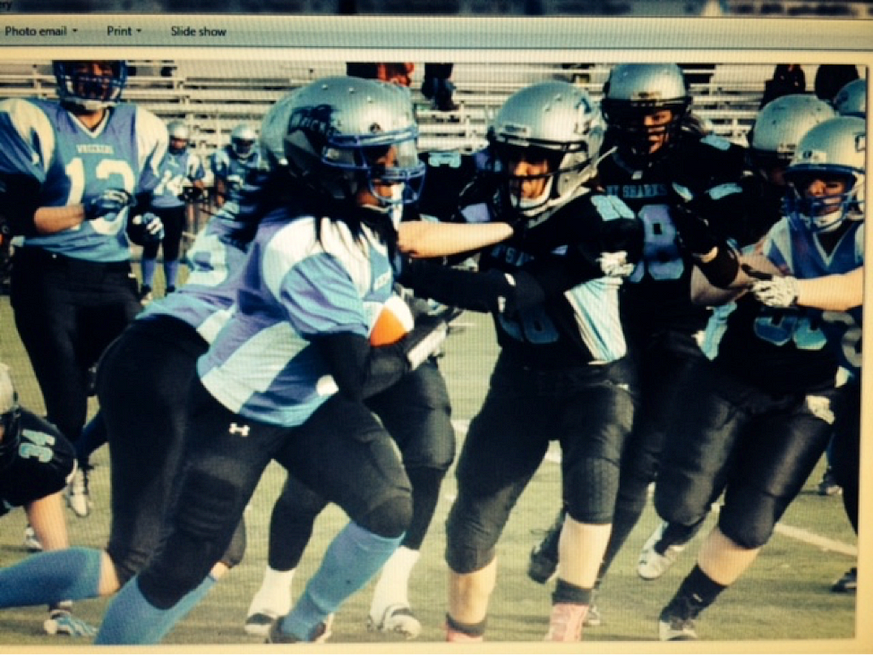
ME: When I first saw you, it was clear that you didn’t fit the idea of a female football player. You know: the stereotypical ‘Butch’ look: bent nose, tooth missing. If anything, you’re the total opposite.
MS. SMITH: That’s part of society thinking like that. We don’t adhere to that; we have all shapes and sizes. We have a girl on our team Nikki Manouchk, she is a really big girl. You would see her and know why she plays football. But she plays on the line. That’s the beauty of football, especially for the women. A lot of women because they’re not small, or might have a large physical frame they say, “What’s for me? What can I do? Where I really fit in?” In football, it takes all shapes and sizes to compete and have a complete team.
ME: You stated that you only play three years. What’s the average lifespan for a female professional football player?
MS. SMITH: It varies for many reasons. There’s a girl on our team — Karen Mulligan — she’s played quarterback for New York Sharks for 14 years. There are other girls our team [that have] played for eight years, there are other girls that played for five; it all depends. The biggest problem: on top of playing, the girls also have to hold down a 9-to-5 job, and fit football in around that. Whereas with the men, their primary job is football; as women, we don’t have that luxury.
ME: Okay, with that statement dovetails directly into my next question: In today’s society you hear the words ‘professional athlete,’ and right away the first thing that comes to mind is, “oh they must be rich.” The amount of monies involved in today’s professional sports contracts are astronomical; how’s that working out for the women in the IWFL?
MS. SMITH: To tell the truth, it doesn’t. It doesn’t work for the women to get rich, it doesn’t even work for the women to get paid; only the coaches are getting paid. We charge admission to our games, but if the crowds aren’t big enough, the gate money only covers operation expenses. After operating expenses and overhead, there’s just not enough money to divvy up between 45 girls on the roster. Our games are attended by only between one hundred to maybe three hundred people.
ME: That’s awfully small turnout for a football game. You’d think it would be twice that many just from curiosity alone.
MS. SMITH: I agree it should be a lot more people. The main problem is people don’t come to the games because nobody knows about us. We don’t have marketing money, no one supports us. We are self-sufficient. We would love to have sponsors — maybe somebody like Under Armour could contribute like $50,000, which in today’s sports industry, is a drop in the bucket. They could also help support us by contributing some of their merchandise, because all the girls already wear their gear. But for some reason, they don’t see the plus in supporting us because we’re girls? I don’t know.
ME: That is surprising, because it seems like you would and should get a lot more attention, just because professional women’s football is such a foreign concept. Women playing full-contact ball in pads and helmets. Speaking for myself, had I known about it, I would definitely would have been in the stands, and I’m sure that there’s a lot football fans would go to games, even if to just to see what this is all about.
MS. SMITH: Yes, of course, I can understand the curiosity, but passed the curiosity, it is football. It’s the same: the same equipment, rules are the same, the same refereeing, and the same regulation-size football field. We play exactly the same way the NFL plays. The only difference is that we’re women playing football not men, and we’re not trying to be men. We’re women who happen to love the game of football, and we love it so much we play it, and we play it on a skilled level. It’s the same as the NBA: you have men playing in the NBA, and you have the women playing in the WNBA. The only difference [between the two] is that they are women. It is the same with us and NFL.
ME: I see that your team went undefeated last year. Who are the star players on your team, who are the standouts?
MS. SMITH: There’s a couple of star players on the team; our star wide receiver would be Maggie Natel, and our star defensive backs are Nhadi Brown and Jewelle Grimsley; our star quarterback is Karen Mulligan. Our star defensive end is Delmara Reese (we call her ‘Reese the Beast’). I would have to say we have about eight to ten standout players.
ME: Let’s say a family hears about the Independent Women’s Football League, and they want go to a game. Everybody in the family is excited and ready to go they jump in the car. Now what? How do they go about it? Where do you go? What does a person have to do to attend one of your football games?
MS. SMITH: Okay, there is a woman’s professional football team in every state. There are different leagues, but there is a team in every state. The New York Sharks play at Floyd Bennett Field in Brooklyn, also called the ‘Sports Aviator Complex’. We are also on the web at www.iwflsports.com, and it will list all the games, dates and locations.
ME: You are retired now. In your career you only played three years — why so short, and how would you rate yourself as a player?
MS. SMITH: Rating myself, I would have to say I was moderate, but because of injuries I was only able to play a short while. I came into the league at 42 years old, and I already had some injuries from doing construction work earlier in my life. As a player, I wound up having double knee surgery, and because of that I had to cut my career short. I know when I played I loved it, and I miss it tremendously. I wish I had known about it early in life; I definitely would have been out there playing.
ME: The NBA accepted and started a woman’s basketball league — the WNBA. What surprises me is: hasn’t anyone in the NFL reached out to the Independent Women’s Football League, to act at least in a supportive role, if nothing else?
MS. SMITH: When our league has reached out to the NFL, we’ve been greeted with closed doors. The only NFL teams that have shown our league any type of love are the New Orleans Saints and the New York Giants. The Saints opened up their training facility to 224 women from 16 countries, and allowed these women to use their facility for a week; the Giants allowed the Sharks to scrimmage at half-time during one of the Giants’ home games.
ME: Going back to the WNBA as an example, during this season on any given weekend, I could turn on the television and catch one of the games. It seems to have great fan support, and the players are getting paid. These women have the benefits of a team medical staff, so they don’t have to worry about what to do if they sustain an injury. It looks as if the WNBA is a pretty good money-maker. Now on the other side, there’s the women of the Independent Women’s Football League playing a pretty good level of football — but it’s as if rest of the world doesn’t know the IWFL exists. Seems to be that somebody’s missing the boat?
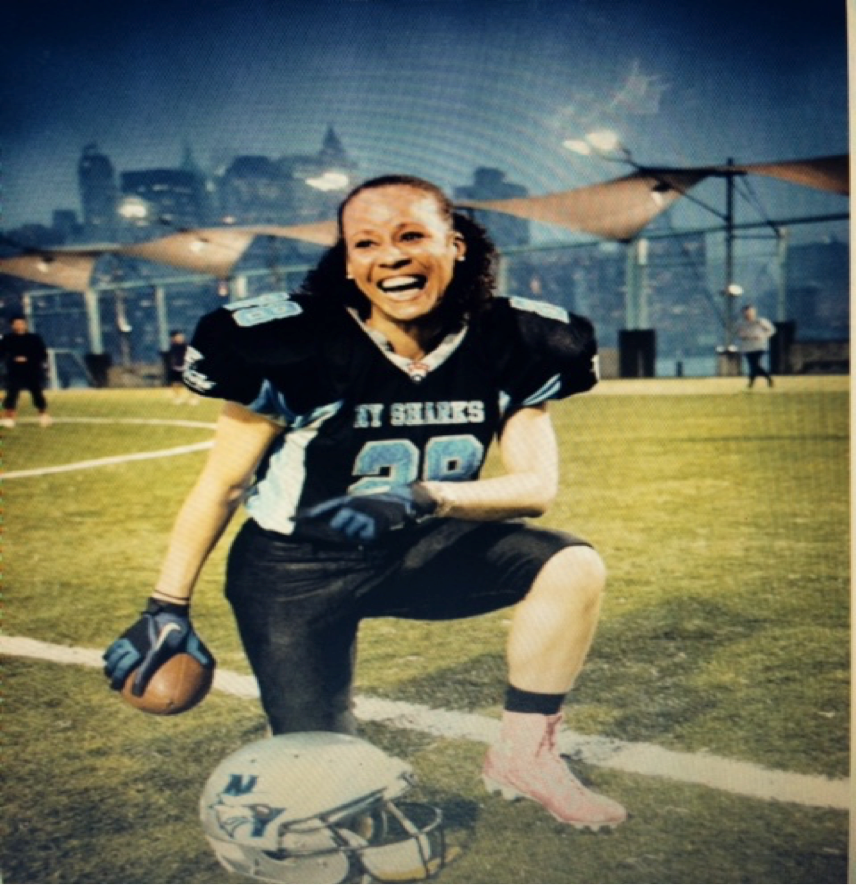
MS. SMITH: Well, the NBA and the WNBA are making money off the women, but these ladies don’t make near the amount of money the men make. And in my 47 years of existence, that doesn’t surprise me because I’ve learned women don’t get treated equally — and never have. That is still very prevalent today. One of the reasons why the New York Sharks, for the women and their families, are a source of pride. It is because [the Sharks] empowers us; we’re trying to make a mark in this world, to let people know women can do anything they want, and not be put into a box the way society puts up gender barriers. We will break those barriers down.
ME: A few years ago there was a young lady who earned a roster spot on the University of Colorado Buffaloes football team as a placekicker. Do you see a day where a woman could possibly make it all the way to the NFL?
MS. SMITH: That’s not our goal. Our goal is to not have one of our players in the league competing against men, that’s not our mindset. When you see a woman or girl playing with boys and men in high school and college, it’s not because we really want to play against them. It’s mainly because there’s no other place for the women to play.
ME: You know, you make a very valid point. In a way, you’re really an ambassador for your league. Would you agree?
MS. SMITH: I never really thought about it like that before, but I advocate for my team. I advocate for women’s football players. I believe in what we stand for; I believe in what we’re about, and I will stand by that until the day I die.
ME: Getting back to when you played, was there ever a time when you were on the football field and said to yourself, What am I doing out here? What did I get myself into? Has anything like that ever crossed your mind?
MS. SMITH: Yes, of course it did — the first time I ever had training camp! It was more like boot camp: a lot of running, calisthenics, and agility drills. After a couple of days of that, we put on the pads for the first time. The night before our first day of full contact, I was a nervous wreck. I couldn’t sleep that night; I sat up all night thinking about, “Oh no, tomorrow we will be tackling and hitting each other. What am I going to do? What did I get myself into?”
Then the day came and it happened. I was playing running back, and I was apprehensive. I didn’t want to run through the line. A couple of girls on the team called me out, and asked me what was wrong with me, and [I’d better] get my head into it and let’s go!
Now I’m embarrassed, so the next play I lined up behind the fullback and we ran the play. I ran through the two hole in the line. I got tackled and I laid there for a minute. I look at my hands and my feet — and they were still there. As I was getting up, I said to myself this is fun, this is great, and I couldn’t wait to do it again.
After that I was okay but if you’ve never played full-contact football before, being hit on a football field is something you have to get used to. You’re going to be nervous and apprehensive — and I believe that’s with both genders.
ME: So, to change it up just a little bit: Where do you see yourself and where do you see your league in 10 years?
MS. SMITH: In 10 years I see us as world-known; I see us filling up stadiums, I see the NFL finally embracing us and calling us their sisters, as we rightfully are. I see a bigger fan base, and I see more girls coming out to play.
ME: Before we wrap this up, Ms. Smith, is there anything else you’d like to share? A message you’d like to convey to the ladies out there — and to the men, for that matter?
MS. SMITH: That we’re not trying to compete with the men. We’re women; we just want to [play] football for women, and be a positive example for young girls. That we are openly looking for sponsors so we can keep moving forward. We also have a foundation for girls: it’s called Fins Up Foundation for Female Athletes [www.womensgridironfoundation.org/girls-camps]. It helps empower young women and girls: it helps them believe in themselves, to know their self-worth, to love themselves and respect themselves and others. And through hard work and determination, they can do or be anything they want — and that’s part of what the New York Sharks and the Independent Women’s Football League is all about.
After interviewing Ms. Collette Smith, it was more than obvious that she is passionate for the game of football. She’s more than just knowledgeable about it; I could tell she really loves the game. In today’s sports-driven society, it’s almost a crime that these ladies play in near-obscurity. Is this because we still function under time-dated, preconceived stereotypes? I hope not, but I wonder.
Ms. Smith said that there’s over 80 professional women’s football teams.
In United States of America we owe it to ourselves — if not to the ladies — to at least get out there and see what their brand of football is all about. Their season starts in April that’s right about the time a true football fan starts to suffer through Football Withdrawal.
These ladies might just be what the doctor ordered.

